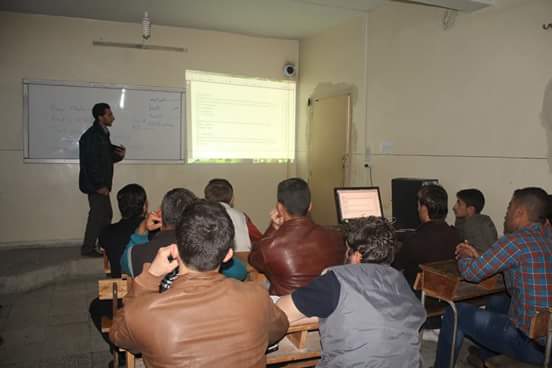A New Generation of Medics

Ruaa had just completed a three-month nursing course at a women’s centre in Kfar Nabel and was working at a private clinic when she heard about a new medical institute in Kfar Nabel.
The 20-year old jumped at the opportunity to further develop her skills and is now studying physiotherapy.
“The need for a job, and the desire to help those attempting to save the lives of the victims of this vicious war, led me towards a career in nursing,” Ruaa told the Damascus Bureau.
Kfar Nabel’s medical institute was founded in early 2016 by a group of activists and doctors. When it proved successful, its founders expanded the project and recruited a large team of doctors with various specialties.
“The institute was founded to deliver scientific and academic education to those interested in providing medical relief,” said its director, Manaf al-Humaidi.
“When we first launched it, we offered six-month academic courses. After obtaining recognition from the Free Idlib health department, our academic courses were extended to two years, thereby giving our graduates the chance to find employment at medical facilities and field hospitals in liberated areas.”
Tuition combines academic and practical elements. The academic part comprises of seven subjects including first aid, physiotherapy, anatomy and pharmacology, all which are taught on site at the institute. The practical element is taught in medical centres and field hospitals across Idlib’s countryside.
Students applying to study at the institute must be under 30 years of age, and must be secondary school graduates.
One student enrolled at the institute is 21 year-old Salim.
“I could not go to university after I graduated from school, as all universities are located in government held areas,” he said.
When the medical institute opened in his city of Kfar Nabel, Salim did not hesitate to enrol. The added bonus is that he does not need to commute.
The institute’s workforce consists of seven specialist doctors, a team of pharmacists, nurses and experienced trainers.
Doctors are responsible for teaching students medical science, human anatomy and the treatment and prevention of diseases.
Pharmacists teach students about the different types and formulas of medicines, recommended dosages and side effects.
Meanwhile, nurses train students on the principles of first aid, how to make plaster casts and how to administer IV drips.
“We teach students everything they need to know in order to tend to the wounded,” said Khalid Katuf, a senior nurse at the institute,
“Ambulances and paramedics are overwhelmed by the numbers of casualties they tend to, which is why

we need more qualified staff.”
The institute also hosts a variety of medical seminars for its lecturers and visiting professors.
Louay, a 19-year-old student at the institute, said that he hopes to become a nurse so as to save lives.
“I have great respect for all the medics who have been killed while on duty,” he said. “I hope to follow in their footsteps and help my fellow countrymen who fall victim to the crimes of the regime.”
Hadia Mansour is the pseudonym of a Damascus Bureau contributor from Idlib, Syria.
Read the Arabic version of this article here
